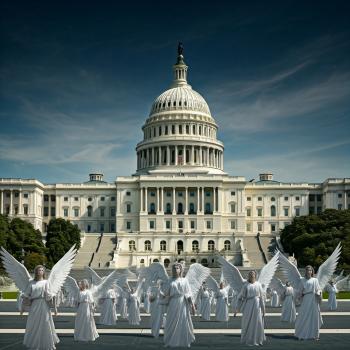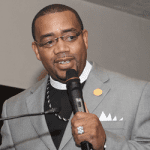(Originally posted April 25, 2008. This got lost in the migration from TypePad to WordPress, recovered and reposted for the archives here thanks to the Internet Archive Wayback Machine.)
Left Behind, pp. 426-430
From here on the rest of Left Behind is all building up to the big final scene in which the Antichrist, like Chekhov’s gun, finally goes off. The end of Chapter 23 here is part of this build-up, an attempt to create and sustain suspense leading up to Buck’s next encounter with Nicolae Carpathia.
Bruce Barnes has just finished providing Buck with a short checklist of things the Antichrist will do during his rise to power: Form one world government based in Babylon, one world currency, one world religion — pretty much all the things that Nicolae had announced he was instituting earlier that same day.
“Did you see the news today?” Buck asked.
“Not today,” Bruce said. “I’ve been in meetings …”
This could have been played for laughs (intentional laughs, I mean), or it could have been written as an eerie reveal — “Everything you just predicted has already happened!” — but this being Left Behind, we instead get a half-page explanation of the workings of Bruce Barnes’ answering machine.
No, really:
Buck told him what had happened at the U.N. Bruce paled. “That’s why we’ve been hearing all those clicking sounds on my answering machine,” Bruce said. “I turned the ringer off on the phone, so the only way you can tell when a call comes in is by the clicking on the answering machine. People are calling to let me know. …”
Sometimes I almost feel sorry for the authors. Here they finally arrive, albeit belatedly, at this Big Reveal, a moment they’ve been building up to for hundreds of pages. Two major characters finally come to accept the terrifying reality they’ve both feared for some time but didn’t quite dare to believe and then …
And then the authors just can’t help themselves. They immediately steer off into a discussion of the clicking sounds an answering machine makes when the ringer is turned off. Even when they’re not actually on the telephone, they wind up talking about the telephone. (I’m starting to wonder if maybe all this telephony has to mean something, that maybe it’s some kind of deeper theme the meaning of which, like the recurring bears in John Irving,* simply eludes me.)
This brings us to the “bullets won’t stop him” portion of the monster movie. Here Bruce plays the role of the Spooky Old Man in the village who knows all the legends about the local monster, its strengths, weaknesses and super powers.
“The Antichrist is a deceiver. And he has the power to control men’s minds. He can make people see lies as truth.”
Buck told Bruce of his invitation to the pre-press conference meeting.
“You must not go,” Bruce said.
“I can’t not go,” Buck said. “This is the opportunity of a lifetime.”
“I’m sorry,” Bruce said. “I have no authority over you, but let me plead with you, warn you, about what happens next. …”
I can’t help but wonder if Bruce were talking to a member of his congregation, would he begin by saying, “I do have authority over you?” I don’t think I’ve ever heard someone use the word “authority” in this context. Usually when taking this line of argument, a person will say something like “I can’t tell you what to do,” or “I can’t make up your mind for you.” I can’t imagine someone instead saying what Bruce says here unless that person were a military officer or an overbearing CEO or someone else who is accustomed to exercising authority over others.
For some reason, when someone says, “I can’t tell you what to do,” it never strikes me this way. It never seems as though they’re suggesting, “I can tell some people what to do, but you don’t happen to be one of those people.” Yet that is what Bruce’s phrasing seems to imply. It seems as though he’s saying, “As a senior pastor, I have authority over my congregation, but since you’re not yet part of that congregation, I can’t yet give you orders.” It’s the sort of comment that would make me extremely reluctant to join this man’s church.
Bruce is convinced that the Antichrist is Up To Something, yet, despite all his prophecy study, he isn’t sure exactly what.
“He undoubtedly has ulterior motives for wanting you there.”
“I’m no good to him.”
“You would be if he controlled you.”
“But he doesn’t.”
“If he is the evil one the Bible speaks of, there is little he does not have the power to do.”
If I’m following this correctly — and at this point I’m fairly sure I’m not — it seems that in the LB-verse we humans have free will when it comes to our dealings with God, but not when it comes to our dealings with Satan.
“I warn you not to go there without protection.”
(I’ll refrain here, but I’ll be disappointed if this isn’t pounced on in the comment section.)
“I warn you not to go there without protection.”
“A bodyguard?”
“At least. But if Carpathia is the Antichrist, do you want to face him without God?”
… “I don’t think I’m going to get hypnotized or anything.”
“Mr. Williams, you have to do what you have to do, but I’m pleading with you. If you go into that meeting without God in your life, you will be in mortal and spiritual danger.”
Ah. Only God can protect you from the Antichrist’s mind-control mojo. Here then, neatly laid out, are The Rules for the big final scene unfolding over the next two chapters. Buck will be going to meet the Antichrist who is sure to turn him into the devil’s pawn by using his mind-control powers. Unless, that is, Buck instead invokes the counter-spell of divine providence.
I say “counter-spell” because here again LaHaye & Jenkins’ notion of spiritual warfare is difficult to distinguish from sorcery. The Antichrist can cast a spell that we are powerless to resist. That would mean we’re all doomed except that we can invoke the magic words spell, which God is powerless to resist, and thereby compel God to cast his counter-spell against the Antichrist.
It’s kind of like a cosmic game of rock-paper-scissors. Antichrist beats human beats God beats Antichrist.
This is strange theology, to say the least, but if one agrees to go along for the ride without trying to reconcile any of this with conventional or biblical Christianity then these Rules work well enough as a premise for the coming showdown with Nicolae.
In order to maintain the suspense surrounding that showdown, the reader has to be kept in doubt about the state of Buck’s soul. This requires something of a departure from the standard tropes of didactic evangelical fiction. This scene cannot end with Buck’s conversion, since that would spoil the is-he-or-isn’t-he? drama of his encounter with Carpathia.
It’s interesting that the authors thought it necessary to up the ante here. They’ve insisted all along that salvation — saying “the prayer” and invoking “the transaction” — is the most important thing in the world. Up until now I’d have thought that, for them, “Without God in your life, you will be in mortal and spiritual danger” could have stood alone as a statement for anyone. Yet here that statement is qualified, “If you go into that meeting without God in your life …”
This is an odd inversion of the old evangelist’s cliché. At some point you’ve probably heard an evangelist ask some variation of this question: “If you were to stand before God and He were to ask you why He should let you into His heaven, what would you say?” Here, instead, Bruce is in effect asking Buck, “If you were to stand before Satan and he were to ask you why he shouldn’t take you to Hell …”
“If you go into that meeting without God in your life, you will be in mortal and spiritual danger.”
He told Buck about his conversation with the Steeles and how they had collectively come up with the idea of a Tribulation Force. “It’s a band of serious-minded people who will boldly oppose the Antichrist.”
There’s no ellipsis there, nothing omitted between those two paragraphs.
So let’s recap, according to Bruce: 1. The Antichrist can control the minds of anyone who isn’t born again; 2. Buck isn’t born again; 3. Buck is about to meet with the Antichrist.
Given all that, Bruce decides the best course of action is to tell Buck all about his super-secret anti-Antichrist guerrilla squad and to provide him a list of the founding members. Genius.
I suspect the idea here has to do with what Bruce and the authors regard as a more compelling sales pitch. A personal relationship with a loving God just doesn’t seem as exciting as the idea of being recruited into an army, into God’s commando squad.
The Tribulation Force stirred something deep within Buck. It took him back to his earliest days as a writer, when he believed he had the power to change the world. He would stay up all hours of the night, plotting with his colleagues how they would have the courage and the audacity to stand up to oppression, to big government, to bigotry. He had lost that fire and verve over the years …
If you’ve ever seen the disturbing documentary Jesus Camp, then you have an idea of how effective this kind of recruiting-proselytization can be. That sort of stirring, heart-pounding call to be a part of some greater cause is what the authors seem to be shooting for here. Note though that Jenkins’ clumsy prose again accidentally reveals more than it intends. Staying up late, “plotting … how they would have the courage and the audacity” is the end point here. Such late-night plotting offers all the thrills and none of the discomfort that comes from actually doing anything that might require courage or audacity.**
But while Bruce has no qualms about telling a reporter all about his top-secret resistance squad and its top-secret plans to undermine the new OWG, he draws the line at letting Buck sit in on their meeting:
“I’m afraid not,” Bruce said. “I think you’d find it interesting and I personally believe it would help convince you, but it is limited to our leadership team. Truth is, I’ll be going over with them tomorrow what you and I are talking about tonight, so it would be a rerun for you anyway.”
So Buck can’t come to the meeting because they’ll be discussing things that only the leadership team can discuss and which he’s already heard anyway. Huh?
Bruce offers a lukewarm invitation to their Sunday church service:
“You’re very welcome, but I must say, it’s going to be the same theme I use every Sunday. You’ve heard it from Ray Steele and you’ve heard it from me. If hearing it one more time would help, then come on out. …”
Worth noting here that this is, I believe, the only time in the entire book that anyone other than his dead wife calls Captain Steele “Ray.”
Buck stood and stretched. He had kept Bruce long past midnight, and he apologized.
“No need,” Bruce said. “This is what I do.”
“Do you know where I can get a Bible?”
“I’ve got one you can have,” Bruce said.
So Buck departs, still unsaved and thus still uncloaked in godly protection from Nicolae’s evil powers. Will he be saved in time? The suspense is killing me. (No, wait, that’s the writing. I knew something was killing me.)
The chapter closes with a final two-paragraph vignette inside the exclusive leadership team meeting.
Bruce told the story of Buck Williams, without using his name or mentioning his connection with Rayford and Chloe. Chloe cried silently as the group prayed for his safety and for his soul.
The point of view for this scene is a bit confusing. Thus far the pattern has been for every scene to be from either Buck’s or Rayford’s perspective. Yet Buck isn’t present for this scene, so it can’t be from his POV. And the narrator mentions that Chloe is crying, so it can’t be from Rayford’s POV either since, as a rule, he never notices when his daughter is crying.
Chloe is crying because she knows Bruce is talking about her boyfriend. But I also like to think she’s crying because she’s smarter than Bruce and she realizes that Pastor Moron has put all their lives in jeopardy by telling her unsaved boyfriend all their secrets before he goes to hang out with Mr. Mind Control. (“The minds behind every military, diplomatic and covert operation in the galaxy, and you put them in a room with a psychic.”)
– – – – – – – – – – – –
* Seriously, what’s with the bears already? I finished A Prayer for Owen Meany and I thought, “That was beautiful and, for once, no bears.” But then I started wondering what the absence of bears might mean …
** This is why I find the manipulation of children in Jesus Camp horrifying, but I’m not terribly worried about their “revolution” succeeding. As with most of the theocratic strands of American Christianity, I’m more concerned with what the leaders of such groups are doing to their own followers than I am about what they might actually do to the rest of us. This is true of those leaders as well — they’re far more concerned with manipulating their followers than with changing the rest of the world. That doesn’t mean, of course, that we can afford to be completely unconcerned with their external agenda and its effects on their external victims, but in opposing that agenda we have always to keep in mind that such groups’ internal victims are no less real, and no less victims. That’s why, for example, I’ve tried here to focus my criticism on LaHaye & Jenkins as the peddlers of this dangerous nonsense and to avoid, for the most part, mocking their millions of followers.
















